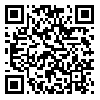Fri, Feb 20, 2026
[Archive]
Volume 36, Issue 1 (1-2022)
Med J Islam Repub Iran 2022 |
Back to browse issues page
Download citation:
BibTeX | RIS | EndNote | Medlars | ProCite | Reference Manager | RefWorks
Send citation to:



BibTeX | RIS | EndNote | Medlars | ProCite | Reference Manager | RefWorks
Send citation to:
Aslani N, Behmanesh A, Garavand A, Maleki M, Davoodi F, Shams R. The Virtual Reality Technology Effects and Features in Cardiology Interventions Training: A Scoping Review. Med J Islam Repub Iran 2022; 36 (1) :556-564
URL: http://mjiri.iums.ac.ir/article-1-8104-en.html
URL: http://mjiri.iums.ac.ir/article-1-8104-en.html
Department of Health Information Technology, School of Allied Medical Sciences, Lorestan University of Medical Sciences, Khorramabad, Iran , garavand.a@lums.ac.ir
Abstract: (2277 Views)
Background: Virtual Reality (VR) as an emerging and developing technology has received much attention in healthcare and trained different medical groups. Implementing specialized training in cardiac surgery is one of the riskiest and most sensitive issues related to clinical training. Studies have been conducted to train cardiac residents using this technology. This study aimed to identify the effects and features of VR technology in cardiology interventions training.
Methods: This scoping review was conducted in 2021 by searching PubMed, Scopus, and Web of Sciences scientific databases by combining the related keywords. A data extraction form was used for data gathering. Data analyses were done through the content analysis method, and results were reported based on the study objectives.
Results: 21 studies were included; from the 777 articles found in the initial searches, seven (33.33%) were RCT studies. VR-based education studies in cardiology interventions have grown significantly in recent years. The main effects of applying VR include improved user attitude and satisfaction, improved performance after VR training, and improved training and learning. Input devices include tracking devices, point input devices, and controllers. Output devices were three main categories include graphics audios and haptic.
Conclusion: The use of new technologies, especially VR, can improve the efficiency of medical training in clinical settings. It recommends that this technology train the necessary skills for heart surgery in cardiac residents before performing real surgery to reduce the potential risks and medical errors.
Methods: This scoping review was conducted in 2021 by searching PubMed, Scopus, and Web of Sciences scientific databases by combining the related keywords. A data extraction form was used for data gathering. Data analyses were done through the content analysis method, and results were reported based on the study objectives.
Results: 21 studies were included; from the 777 articles found in the initial searches, seven (33.33%) were RCT studies. VR-based education studies in cardiology interventions have grown significantly in recent years. The main effects of applying VR include improved user attitude and satisfaction, improved performance after VR training, and improved training and learning. Input devices include tracking devices, point input devices, and controllers. Output devices were three main categories include graphics audios and haptic.
Conclusion: The use of new technologies, especially VR, can improve the efficiency of medical training in clinical settings. It recommends that this technology train the necessary skills for heart surgery in cardiac residents before performing real surgery to reduce the potential risks and medical errors.
Type of Study: Review Article |
Subject:
Cardiology
Send email to the article author
| Rights and permissions | |
 |
This work is licensed under a Creative Commons Attribution-NonCommercial 4.0 International License. |








